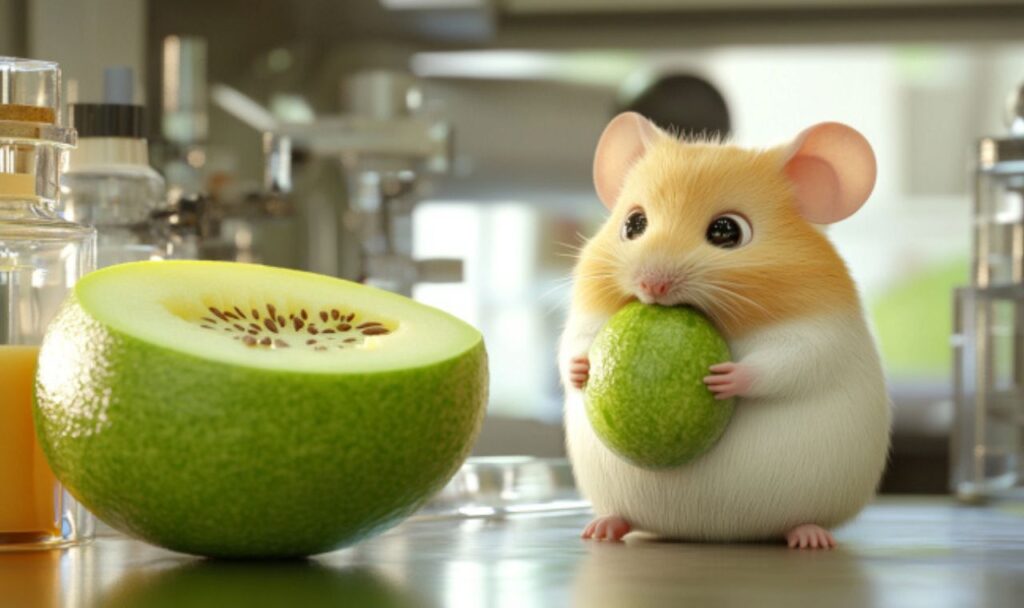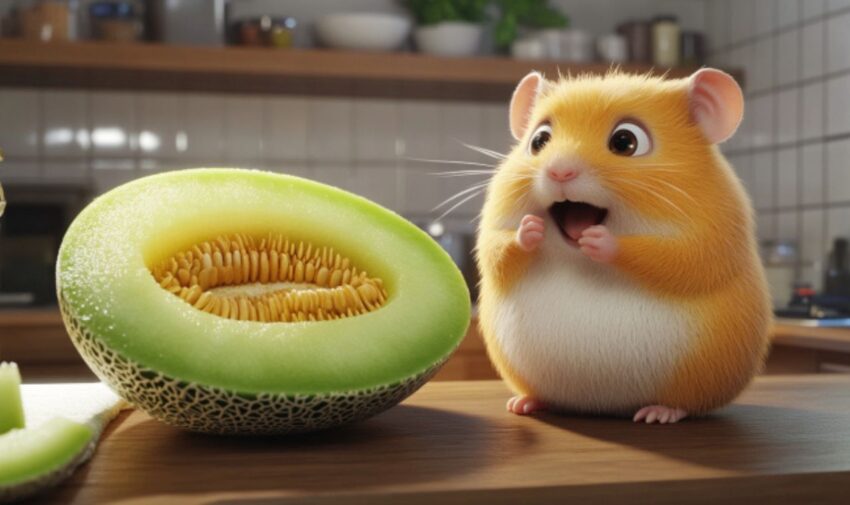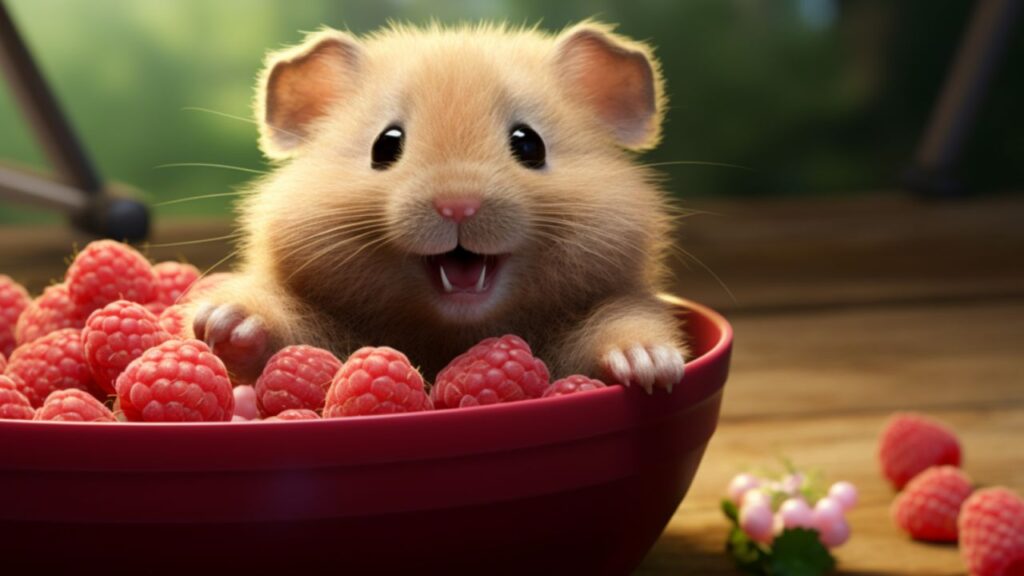TL;DR Summary
Yes, hamsters can eat honeydew melon, but only in moderation. Honeydew is a hydrating, nutrient-rich fruit that offers vitamins and minerals like vitamin C and potassium. However, its high sugar and water content mean it must be given sparingly to avoid digestive issues or obesity.
- Syrian Hamsters: A pea-sized piece once or twice a week is safe.
- Roborovski Hamsters: A small piece every 1–2 weeks is fine.
- Dwarf Hamsters (Campbell’s, Winter White, Chinese): A tiny portion (half a pea) once every two weeks, if at all, due to their sensitivity to sugar.
Always remove uneaten pieces to avoid spoilage, introduce honeydew gradually, and monitor for adverse reactions like diarrhea. When fed properly, honeydew can be a refreshing treat for your hamster!
Hamsters are tiny bundles of energy with equally tiny stomachs, making their diet an essential part of their health and happiness. As a pet parent, you may be tempted to share your favorite snacks, like honeydew melon, with your furry friend. But is this sweet, refreshing fruit a safe treat for your hamster?
Honeydew melon, a member of the melon family, is loved by humans for its juicy texture and mild sweetness. Packed with vitamins like C and B6, potassium, and a high water content, it’s a healthy snack for people—but what about for hamsters? Can their little bellies handle it, and if so, how much is safe to give them?
In this article, we’ll explore whether honeydew is safe for hamsters, the benefits and risks of feeding it to them, the proper portion sizes to avoid overindulgence, and the best way to introduce it to their diet. By the end, you’ll know exactly how to treat your hamster with this fruity delight safely!
What Is Honeydew Melon?

Honeydew melon, a luscious and sweet fruit, belongs to the Cucurbitaceae family, which includes cucumbers, pumpkins, and other melons. Known for its pale green flesh and smooth, yellowish rind, honeydew is often enjoyed as a refreshing snack or dessert. Its high water content and subtly sweet flavor make it a favorite during hot summer months.
Not only is honeydew delicious, but it’s also packed with nutrients that are beneficial for humans. This nutrient-rich fruit contains vitamins, minerals, and antioxidants, making it a guilt-free snack that hydrates and nourishes. However, when it comes to sharing it with our little hamster companions, we need to take a closer look at its nutritional profile.
Nutritional Content of Honeydew
Here’s a quick look at what makes up honeydew melon (per 100 grams):
- Water Content: 90%
- Calories: 36
- Sugars: 8 grams
- Dietary Fiber: 0.8 grams
- Vitamin C: 18 mg (30% of the daily value for humans)
- Vitamin B6: 0.1 mg
- Potassium: 228 mg
Why This Matters for Hamsters
Hamsters have specific dietary needs, and understanding honeydew’s nutrient profile helps determine whether it’s suitable for them:
- Water Content: The high water content in honeydew helps with hydration, especially in hot weather. However, too much water can lead to diarrhea in hamsters.
- Sugar Levels: Honeydew is naturally sweet, containing 8 grams of sugar per 100 grams. While this may seem moderate, excessive sugar can lead to obesity and diabetes, especially in dwarf hamster species, which are more prone to these conditions.
- Vitamins: Vitamin C supports immune health, while vitamin B6 aids in metabolism and energy production. These are helpful in small amounts for hamsters.
- Fiber: Although minimal, the dietary fiber in honeydew can contribute to healthy digestion when fed in moderation.
In summary, honeydew melon offers several nutritional benefits, but its high water and sugar content mean that moderation is key when feeding it to your hamster. This juicy fruit can be a healthy addition to your hamster’s diet if introduced thoughtfully—more on that in the next section!
Can Hamsters Eat Honeydew?

Yes, hamsters can eat honeydew melon, but only in small amounts and as an occasional treat. This sweet fruit is safe for most hamster species when given properly, but it must be offered in moderation to avoid potential health issues. The key lies in understanding the specific dietary needs and tolerances of different hamster species, as not all hamsters can handle sugary or water-rich foods the same way.
Honeydew and Different Hamster Species
Syrian Hamsters
Syrian hamsters are the largest and most robust of all pet hamster species. They have a slightly higher tolerance for sugary foods like honeydew compared to their smaller cousins. As a result, a small cube of honeydew (about the size of a pea) once or twice a week is generally safe for them. However, even with Syrians, overindulging in sweet treats can lead to obesity and other health problems, so always prioritize a balanced diet.
Dwarf Hamsters (Campbell’s, Winter White, and Chinese Hamsters)
Dwarf hamsters, including Campbell’s, Winter White, and Chinese hamsters, have a much lower tolerance for sugar. These smaller species are particularly prone to diabetes and obesity, making sugary fruits like honeydew a riskier choice. While it’s not inherently toxic to them, any treat with natural sugars should be given very sparingly. A tiny piece of honeydew (no larger than half a pea) no more than once every two weeks is generally a safe guideline for dwarf hamsters.
Roborovski Hamsters
Roborovski hamsters, though also small, are less prone to diabetes compared to other dwarf species. They fall somewhere between Syrians and dwarf hamsters in terms of tolerance for sugary foods. A small piece of honeydew (pea-sized) every one to two weeks is safe for Robos, as long as it doesn’t replace their staple diet of hamster pellets, seeds, and fresh vegetables.
Individual Tolerance and Health Considerations
While general guidelines exist, it’s important to remember that each hamster is unique. Some hamsters may tolerate honeydew better than others, depending on factors like age, overall health, and dietary habits. Always monitor your hamster’s reaction when introducing any new food. Signs of intolerance, such as diarrhea, lethargy, or weight gain, indicate that honeydew may not be a good fit for your pet.
Benefits of Honeydew for Hamsters

When given in moderation, honeydew melon can provide some noteworthy benefits for your hamster. Its nutrient-rich composition can support their health and well-being, offering a tasty and hydrating snack. Here are the key benefits of honeydew for hamsters:
1. Hydration Boost
With a water content of around 90%, honeydew is an excellent way to keep your hamster hydrated, especially during warm weather. Proper hydration is essential for maintaining healthy bodily functions, particularly for hamsters who may not drink enough water on their own.
2. Vitamin C for Immune Support
Vitamin C is a powerful antioxidant that helps boost the immune system. While hamsters can synthesize their own vitamin C (unlike guinea pigs, who need external sources), small amounts from fresh foods like honeydew can provide additional support, especially during times of stress or illness.
3. Vitamin B6 for Energy
Honeydew contains vitamin B6, which plays a role in energy production and overall metabolic health. This is especially important for active hamsters, who burn a lot of energy running on their wheels or exploring their enclosures.
4. Aiding Digestion with Fiber
Though honeydew isn’t high in fiber, its small fiber content can still help support your hamster’s digestive system. Fiber promotes gut health and can aid in preventing constipation when offered as part of a balanced diet.
5. Potassium for Muscle and Nerve Function
Potassium is an important mineral for maintaining healthy muscle and nerve function. While hamsters only require trace amounts of this mineral, the potassium in honeydew is an added bonus when given sparingly.
In short, honeydew’s high water content and nutrient profile make it a refreshing and healthful treat for hamsters—provided it’s given in the right portions and frequency.
Risks of Feeding Honeydew to Hamsters

While honeydew has its perks, there are potential risks involved if it’s not fed properly. Overindulgence or improper preparation can lead to health issues that may outweigh the benefits. Here’s what to watch out for:
1. High Sugar Content
Honeydew is naturally sweet, containing about 8 grams of sugar per 100 grams. Hamsters have tiny bodies and cannot process large amounts of sugar efficiently. Excessive sugar consumption can lead to obesity, diabetes, and tooth decay, particularly in dwarf hamster species that are more prone to these conditions.
2. Overhydration and Digestive Issues
The high water content in honeydew, while great for hydration, can cause problems if overfed. Too much water can lead to diarrhea, which can quickly dehydrate a hamster and upset their digestive system. Small, controlled portions are key to avoiding this issue.
3. Choking Hazards
Honeydew’s smooth texture and slippery nature can pose a choking risk, especially if pieces are too large or not cut properly. Hamsters use their cheek pouches to store food, and improperly sized pieces can get lodged, creating a dangerous situation.
4. Disruption of a Balanced Diet
Treats like honeydew should only make up a tiny fraction of a hamster’s diet. Over-reliance on sugary fruits can displace essential nutrients found in their staple foods, such as high-quality hamster pellets, seeds, and fresh vegetables.
5. Spoilage and Hygiene Concerns
Honeydew spoils quickly, especially in warm environments. Leaving uneaten pieces in your hamster’s cage can attract bacteria or mold, which can make your pet sick. Always remove any leftovers promptly.
How to Safely Feed Honeydew to Your Hamster

Introducing honeydew melon to your hamster’s diet can be a delightful treat for them—if done correctly. Hamsters have sensitive digestive systems, so proper preparation, portioning, and observation are crucial. This step-by-step guide will ensure your hamster enjoys honeydew safely and healthily.
Step 1: Choose Fresh and Ripe Honeydew
Always select high-quality honeydew melon. Look for ripe, fresh fruit with a sweet aroma and firm flesh. Avoid overripe or underripe melons, as they may be harder for your hamster to digest. If possible, opt for organic honeydew to avoid pesticide exposure.
Step 2: Wash Thoroughly and Remove the Rind
Before serving, wash the honeydew under running water to remove any dirt, bacteria, or pesticide residues. Peel off the rind entirely, as the tough outer skin is indigestible for hamsters and could pose a choking hazard.
Step 3: Cut into Hamster-Friendly Portions
Hamsters need tiny, bite-sized pieces of food. Cut the honeydew into small cubes or pieces no larger than a pea. This ensures that your hamster can safely chew and swallow the fruit without risk of choking or overfilling their cheek pouches.
Step 4: Introduce Honeydew Gradually
When offering honeydew for the first time, start with a very small portion—about half the size of a pea. Hamsters are creatures of habit, and sudden dietary changes can upset their delicate digestive systems. Observe how your hamster reacts to the new treat over the next 24 hours.
If they tolerate it well (no signs of diarrhea or lethargy), you can offer a slightly larger piece next time, but only in moderation. Frequency should not exceed:
- Syrian Hamsters: A pea-sized piece once or twice a week.
- Roborovski Hamsters: A pea-sized piece every one to two weeks.
- Dwarf Hamsters: A tiny piece (half a pea) no more than once every two weeks.
Step 5: Remove Uneaten Pieces Promptly
Hamsters have a habit of stashing food in their bedding, and honeydew’s high water content makes it prone to spoiling quickly. Check your hamster’s cage after feeding and remove any uneaten fruit to prevent bacteria, mold, or odors from developing.
Signs of Overfeeding or Adverse Reactions
Even when honeydew is served in small portions, it’s essential to monitor your hamster for any signs of discomfort or illness. Here’s what to watch for:
- Diarrhea: A common sign of overfeeding or sensitivity to the fruit’s high water content.
- Lethargy: If your hamster seems unusually tired or inactive, they may not be tolerating the treat well.
- Weight Gain: Regular overfeeding of sugary treats like honeydew can lead to obesity.
- Cheek Pouch Issues: If large or slippery pieces are fed, they could become stuck in your hamster’s cheek pouches, requiring veterinary attention.
If you notice any of these symptoms, stop feeding honeydew immediately and consult a veterinarian if the issue persists.
Tips for Safe Treating
To balance their diet, remember that honeydew should never replace your hamster’s staple foods. A healthy hamster diet consists of:
- High-quality hamster pellets or mixes.
- Fresh vegetables (e.g., broccoli, cucumber, or carrot).
- Occasional fruits like honeydew, apple, or strawberry.
Treats like honeydew should only make up about 5-10% of their diet. When in doubt, err on the side of caution and offer less rather than more.
Whisker Tips: Practical Advice for Feeding Honeydew

When it comes to feeding your hamster honeydew, a little preparation goes a long way in keeping your furry friend happy and healthy. Here are some practical tips to ensure safe feeding, proper storage, and alternatives if honeydew isn’t the right fit for your hamster’s diet.
1. Store Honeydew Properly for Maximum Freshness
Hamsters should only eat fresh, high-quality honeydew, so proper storage is key:
- Refrigeration: After slicing your honeydew, store the unused portion in an airtight container in the fridge. This will keep the fruit fresh and free from bacteria for up to 3–5 days.
- Room Temperature Serving: Hamsters may find cold fruit unpleasant. Allow the honeydew to sit at room temperature for a few minutes before serving.
Pro Tip: If you notice any mushy spots, discoloration, or off smells, toss it out—your hamster’s sensitive tummy won’t handle spoiled fruit well.
2. Stick to the Right Feeding Frequency
Treats like honeydew should only make occasional appearances in your hamster’s diet. Overfeeding can lead to sugar overload, digestive issues, or nutritional imbalance. Here’s a quick guide:
- Syrian Hamsters: A small piece (pea-sized) once or twice a week.
- Roborovski Hamsters: A small piece every one to two weeks.
- Dwarf Hamsters: A tiny piece (half a pea) no more than once every two weeks.
Stick to these guidelines to avoid turning honeydew into an unhealthy habit!
3. Rotate Treats for Variety and Balance
If honeydew isn’t suitable for your hamster (e.g., if they are prone to diabetes or react poorly to it), or if you simply want to mix things up, try these hamster-friendly alternatives:
- Fruits with Lower Sugar Content: Cucumber, zucchini, or small portions of strawberries.
- Vegetables: Broccoli, bell peppers, or green beans are great low-sugar options packed with nutrients.
- Protein Treats: Hard-boiled egg or small pieces of plain, cooked chicken can provide a break from sweet foods while supporting protein needs.
Rotating treats not only ensures variety but also keeps your hamster’s diet balanced and exciting.
4. Monitor for Preferences and Allergies
Just like humans, hamsters have their own likes, dislikes, and sensitivities. Watch how your hamster reacts to honeydew:
- If they eagerly nibble on it and show no adverse reactions, you’ve found a new favorite treat!
- If they ignore it, don’t take it personally—every hamster has its quirks. Try offering another fruit or veggie.
5. Avoid Over-Ripened or Canned Honeydew
While fresh honeydew is safe in moderation, over-ripened or canned honeydew is not:
- Over-ripened Honeydew: The mushy texture can make it harder for your hamster to eat and increases the risk of digestive upset.
- Canned Honeydew: Usually packed in sugary syrup or preservatives, this is a big no-no for hamsters. Always stick to fresh, plain fruit.
6. Always Supervise and Clean Up
Feeding time is a great bonding opportunity! Watch your hamster as they enjoy their treat to ensure they don’t hoard, choke, or have trouble chewing. Afterward, remove any uneaten honeydew promptly to prevent spoilage and bacterial growth in their cage.
Final Whisker Tip: Moderation Is Key
Honeydew can be a delightful and nutritious addition to your hamster’s diet, but it should remain an occasional treat—not a dietary staple. Always prioritize their primary diet of pellets, seeds, and vegetables to meet their nutritional needs.
Conclusion

Honeydew melon can be a refreshing and healthy treat for your hamster when served in moderation. This juicy fruit is rich in water, vitamins, and minerals, making it a hydrating and nutritious snack. However, its high sugar content and potential for overhydration mean that it must be offered sparingly and in small, hamster-friendly portions.
Different hamster species have varying tolerances for sugary foods. Syrians and Roborovski hamsters can enjoy honeydew more frequently, while dwarf hamsters require extra caution due to their predisposition to diabetes. Regardless of the species, honeydew should only be an occasional treat, complementing a balanced diet of pellets, seeds, and vegetables.
As with any new food, introduce honeydew gradually and watch for signs of adverse reactions, such as diarrhea or lethargy. Always remove uneaten pieces promptly to maintain hygiene in your hamster’s cage. When in doubt, consult your veterinarian to ensure your furry friend’s diet supports their health and happiness. Treats like honeydew are an excellent way to bond with your hamster while adding variety to their diet, but remember: moderation is key!
Remember, a happy hamster is a wheel-y happy you!




